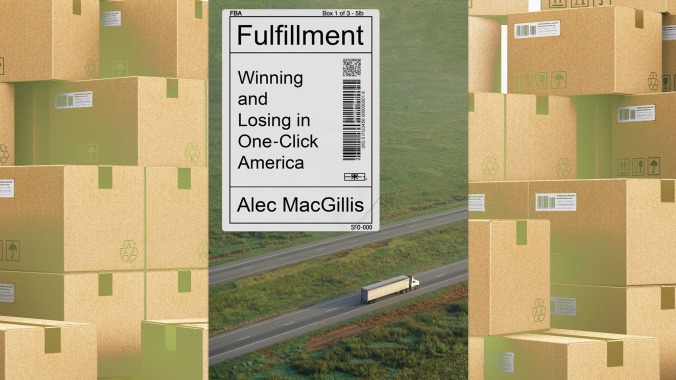Cover image: Farrar, Straus & Giroux Graphic: Natalie Peeples
The mega-corp future that cyberpunk predicted is already here, but instead of fiber-optic mohawks and cybernetic eye implants, all we have to show for it are drones that deliver dog food and productivity wristbands that will fire you for taking one too many piss breaks. In his new book, Fulfillment: Winning And Losing In One-Click America, Alec MacGillis takes readers on a tour of this bleak new world—one forged by Jeff Bezos and Amazon.
A self-professed Tolkien fan boy, the Jeff Bezos who haunts the margins of Fulfillment has less in common with Aragorn or Gandalf and more with Sauron—a distant, all-seeing warlord devoid of personality whose corrupting influence has spread across the globe. MacGillis doesn’t spend much time trying to contextualize or get inside the head of the richest man on Earth; Fulfillment is much more interested in exploring the vast infernal machine Bezos has constructed and in following the personal journeys of Americans caught up in its gears.
MacGillis’ skills as a journalist (he’s a senior reporter at ProPublica) are on full display in Fulfillment, which gracefully interweaves the personal histories of people trying to get by in what the writer aptly calls “the landscape of inequality across the country” with an account of the big-picture events and political/market manipulations that sculpted that terrain. “As above, so below,” as the old occult saying goes: The macro impacts the micro; the invisible hand and the people guiding it leave their fingerprints all over our lives. Like any good detective, MacGillis does a thorough dusting for those prints and outlines the (sometimes literal) bodies in chalk as part of his investigation into how Amazon has changed America.
Fulfillment is divided into chapters with single-word titles like “Isolation,” “Cardboard,” and “Shelter” (as in “tax”). Each focuses on a different aspect of Amazon’s business and operating practices—from delivery and information services to political lobbying and the company’s institutional aversion to paying taxes—and how it affects communities across the country. The narrative hops across the country, with D.C., Seattle, El Paso, and Baltimore in particular acting as hubs that MacGillis returns to throughout. He grounds his investigation by following individual people, getting the perspectives of business owners, workers, activists, and politicians who’ve either worked with or against the company. Every chapter has a Virgil figure guiding us through a different circle of Prime Hell.
The book’s fourth chapter, “Dignity,” showcases MacGillis’ ability to talk about both the forest and the trees. Centering the chapter’s narrative around the Sparrows Point territory in Maryland—at one time the crown jewel in America’s steel industry—MacGillis is able to compress 131 years of labor history, tense race relations, white flight from Baltimore, the collapse of manufacturing in America, and the devaluation of blue-collar work through the point of view of a former Bethlehem Steel employee working at Sparrows Point’s Amazon fulfillment center. The story of Bethlehem Steel and Sparrows Point also underlines an important through-line in Fulfillment: Amazon’s greed and amoral disinterest in the public good isn’t anything new.
What is new, though, is the company’s true innovation: creating layers of mediation that distance people and communities from each other and that center Amazon as the ultimate middle-man. MacGillis details the dystopian working conditions of Amazon’s warehouses: the Advil-stocked vending machines that ease the pain of workers standing on their feet for 10-plus hours a shift, workers holding in their bladders for hours because of strict limitations on bathroom breaks, the constant threat of termination at the hands of an algorithm that monitors productivity and can fire an employee at any time for falling a little behind. Not to mention the threat of bodily injury and death from unsafe working conditions, which MacGillis touches on in a few harrowing chapter breaks. Amazon’s workplace culture alienates not just workers from each other but also managers from their employees, outsourcing the task of firing to a computer program that could care less if someone was late for a shift because their dog died or they were a little slow last Tuesday because their baby kept them awake the night before.
The distancing that happens on the micro-level at warehouses also carries over to how Amazon treats other businesses and cities. Using El Paso as the focal point for one chapter, the author talks to independent office-supply business owners who’ve seen how the company uses its ever-shifting price points (which are sometimes used to sell counterfeit goods) to force the competition to either price themselves out of business or sell through its platform and lose a large chunk of business to Amazon’s cut of the profits. Fulfillment examines how Amazon uses its status as both a seller and a marketplace to shoehorn its way into local governments and cultures, encouraging people to buy local through its website—which keeps people from forming face-to-face connections with those businesses. It’s one thing to be a business; it’s another thing to create the perception that you are how business is done. Why just sell cars when you can also be the road they drive on?
Fulfillment is a very information-rich text, and it can take awhile to sift through all the data and historical tidbits. It is also, to be blunt, a dispiriting read. While there are moments of effective resistance described in the book, it doesn’t offer a hopeful vision of the future. For folks who are already burnt out on doom-scrolling and quarantine-induced existential dread, this book may hit you like a pallet full of back-breaking straws. But the sober, clear-eyed analysis and emotionally involving stories it provides are worth pushing through the “shit sucks” bleakness of it all. You can’t change anything until you see it for what it is. And Fulfillment is a fantastic microscope: It’s not its fault that the slides it’s showing us are so hard to look at.
Author photo: J.M. Giordano









































